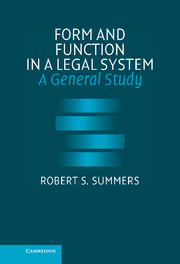Book contents
- Frontmatter
- Contents
- Preface
- Acknowledgments
- PART ONE INTRODUCTION, BASIC CONCEPTS AND DEFINITIONS, AND A GENERAL APPROACH
- 1 Introduction
- 2 Basic Concepts and Definitions
- 3 A General Approach
- PART TWO THE FORMS OF FUNCTIONAL LEGAL UNITS
- PART THREE THE OVERALL FORM OF A LEGAL SYSTEM AND ITS OPERATION
- Name Index
- Subject Index
3 - A General Approach
Published online by Cambridge University Press: 29 July 2009
- Frontmatter
- Contents
- Preface
- Acknowledgments
- PART ONE INTRODUCTION, BASIC CONCEPTS AND DEFINITIONS, AND A GENERAL APPROACH
- 1 Introduction
- 2 Basic Concepts and Definitions
- 3 A General Approach
- PART TWO THE FORMS OF FUNCTIONAL LEGAL UNITS
- PART THREE THE OVERALL FORM OF A LEGAL SYSTEM AND ITS OPERATION
- Name Index
- Subject Index
Summary
“[M]odern … thought … emphasize[s] the importance of method… .”
– M R. Cohen“[I]t is possible to be interested in a phenomenon in a variety of ways [and some are] … not empirical… .”
– L. Wittgenstein“There is no necessity of thought with which we can dispense so little as the division of things into content and form… .”
– G. SimmelINTRODUCTION
In the preceding chapter, I defined and clarified central concepts and terminology in the general theory of legal form set forth in this book. The present chapter is also broadly methodological, but differently so. Section Two is devoted in summary terms to general questions of approach that arise in seeking to advance understanding of functional legal units by focusing on their overall forms. Section Three treats possible empirical and other methodological issues that may arise in attributing credit to forms for ends realized through such legal units. Section Four explains the major differences between a Hartian “rule-oriented” approach to the problems addressed in this book, and what I deploy here as a “form-oriented” approach.
ADVANCING UNDERSTANDING THROUGH STUDY OF FORM
Through study of the overall form of a functional legal unit, of constituent features of this form, and of any forms of component parts of a unit, it is possible to advance understanding of the unit as a whole. Such understanding is worth having for its own sake, as well as for its instrumental value. What, then, is it to understand a functional legal unit?
Information
- Type
- Chapter
- Information
- Form and Function in a Legal SystemA General Study, pp. 64 - 88Publisher: Cambridge University PressPrint publication year: 2005
